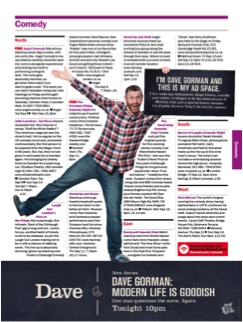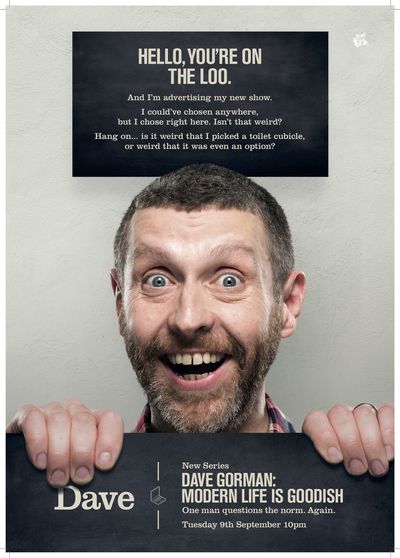
Oh My God, Has Advertising Just Inceptioned Itself?

It’s happened. It’s finally happened. Advertising, as a phenomenon, has just become sentient. Or self-aware at the very least. In a campaign for the new series of British comedian Dave Gorman’s TV show ‘Modern Life is Good-ish’, Wieden+Kennedy London has been going out of its way to challenge everything the modern ad industry holds sacred (targeted online ads, ‘native advertising’, intrusive imagery). And have a bit of a chuckle along the way. It’s all very meta.
I first noticed the campaign during my morning commute. There, embedded between pictures of Rita Ora and Cara Delevigne on the Showbiz pages (go ahead, judge me all you want, see if I care), was the aforementioned Mr Gorman waving a sign that said ‘I’m Dave Gorman and this is my ad space’. The sign told me that because he’d bought the ad space in the newspaper, he could do what he likes with it, and if I did the same I could to. ‘Makes you think?’ it read. And I thought about it, and then moved on with the rest of my day.

But wasn’t until later yesterday evening that the campaign really got under my skin. There I was, browsing Facebook, checking how many ‘likes’ the photo of my boyfriend’s attempt to run the dishwasher using Fairy Liquid had received, when… lolwat? I was greeted by a message that read “Hello female who is planning to go travelling and who likes books.” Umm, hello to you too? I thought, perturbed. “Weird how I know that about you,” continued the ad in my Facebook timeline. “Makes you wonder what you’ve done to get all these other strange adverts.” Had I been on Twitter, I might have been equally shocked by a Dave Gorman-themed post full of photos inspired by the keywords in my tweet. I'm only grateful that I haven't quite been stalked to the pub toilet cubicle yet (yup, he's there too).

I write about advertising, it’s my job to know about targeted ads and data and all that stuff, but I was still taken aback. It might have been the direct and personal writing, which I read to myself in the voice of Gorman. Or it might have been that this post wasn’t just ‘aware’ of its status as one of these annoying ads that clog up people’s social media streams (oh heads up people, it I could stop getting ads for the exact product I’ve just bought online, that would be great), it was actively inviting me to poke holes in the whole construct of the modern advertising industry. Maybe I was reading too much into it as, given the day job, I’m a bit more sensitive to all things ‘advertising’ even after I clock off. It could also be down to the fact that I see so many oh-so-utterly-whizz-bang case studies about campaigns I've never seen out in the real world that I'm still surprised when advertising actually happens to me, as a punter.
The cleverness of the campaign is that its promoting a show that prods at the oddities of every day life by using the same quizzical curiosity that characterises the comedian. In some respects, it's a descendant of the classic VW 'Lemon' ads; it embraces the inherent oddness of advertising. It’s not a serious campaign and, while it certainly invites a little bit of thought, it’s a bit of a cheeky giggle rather than insider sabotage. In fact, the more I think about it, the more I wondered if it might have a bit of a positive knock-on effect for the industry as a whole. If I was a client or business owner, it might make me think ‘huh, this stuff does work’. Or maybe I’d just appreciate advertising that acknowledges its own shortcomings with a bit of humour and a down-to-earth tone.
My boyfriend (let’s just call him Mr. Fairy Liquid) happens to work in a media agency and joked that, on the flip side, the campaign “could re-start a scare-a-thon of ‘ERMEGERD, TERGERTED ERDVERDERSERNG’”. But, i-Robot and a million other Asimov-inspired sci-fi flicks aside, I don’t think a bit of self-awareness is a bad thing. It’ll be interesting to see what the campaign does for viewing figures but at the very least it’s been a playful way to get people from outside of the cluster of media and tech industries to think differently about advertising.













